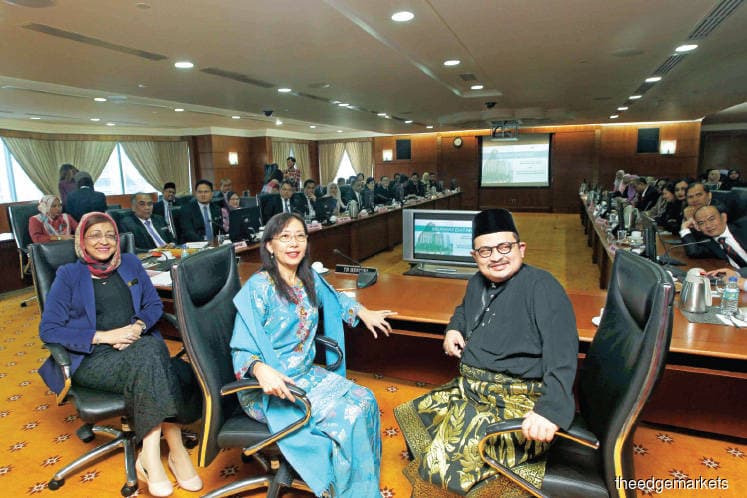
This article first appeared in The Edge Financial Daily on July 3, 2018
PUTRAJAYA: Newly-minted Minister of Primary Industries Teresa Kok said that the ministry will focus on increasing the number of high value-added products from the downstream plantation commodities sector as one of its four main priorities.
Speaking to the press at the ministry yesterday, Kok said that emphasis will be put on research and development (R&D) with commercial value, as well as those which can increase product quality and environmental sustainability.
Kok, who is the Seputeh member of parliament, was sworn in along with 13 ministers and 23 deputy ministers earlier yesterday.
“The function of this ministry is to ensure the continuity of commodity industries across the value chain from upstream to downstream, and that will be my priority, centring around conservation of the environment and national biodiversity,” she said.
This, she explained, will include the palm oil sector.
“Of course, we need to recognise that the anti-palm oil campaign in the EU is something that Malaysia, as a palm oil exporter, need to work hard to campaign against.
“[Prime Minister] Tun Dr Mahathir Mohamad has visited Indonesian President Jokowi (Joko Widodo). He did invite Jokowi to join Malaysia to work together to counter this anti-palm oil campaign.
“I think [this will need] a lot of work. We need to have some [form of] strategic communication plan to see how we can also work together with industry players to promote palm oil and to counter these kinds of negative campaigns against our products,” she said.
Kok said she and Deputy Minister Shamsul Iskandar Mohd Akin will have several dialogues with stakeholders in the coming weeks before narrowing down on different strategies to be implemented to achieve the said objective.
“We will go down to different states in Malaysia, and we need to understand the problems of various players, especially the smallholders who we are very concerned about.
“They are the ones that get hit the most during the downtime of [plantation] commodity prices,” she said.
Reuters reported yesterday that palm oil prices may retrace to a support level at RM2,290 per tonne, according to its market analyst for commodities and energy technicals Wang Tao.
Palm has been hovering near a two-year low over the last two weeks, but added 1.8% in the last week, it reported.
On matters pertaining to the minimum wage and extensive use of foreign labour in the plantation sector, Kok said that it should be discussed by the cabinet considering the subjects involve inter-ministry participation.
The labour-intensive plantation sector has some 85% to 90% foreign workers making up its total labour force, according to recent news reports.
CIMB Research analyst Ivy Ng said in a June 7 note that the palm oil sector will be hit the worst by the government’s plan to raise the minimum wage and reduce foreign labour in the country.
The Pakatan Harapan government had pledged in its election manifesto to equalise the minimum wage to RM1,500 per month with biannual reviews in its first term as the federal government. It also promised to reduce foreign labour to four million from six million in the same period. On a related matter, Kok shared that the primary plantation commodities sector — comprising palm oil, rubber, timber, cocoa, pepper and tobacco — contributed RM140.3 billion or 15% of Malaysia’s total exports in 2017.
The biggest contributor was palm oil with RM77.8 billion (55.5% of total sector exports), followed by rubber with RM32.3 billion (23%), timber with RM23.2 billion (16.6%), cocoa with RM5.6 billion (4%), tobacco with RM1.1 billion (0.8%) and pepper with RM308.9 million (0.2%).
“With total trade value of RM179.8 billion [in 2017], the sector remained [the nation’s] largest net exporter with a trade surplus of RM100.8 billion compared with RM90.1 billion by electrical and electronics (E&E) and RM36 billion by the oil and gas (O&G) sector,” said Kok.
However, Kok also highlighted a 7.1% year-on-year decline in exports by the sector in January-April 2018 to RM43.5 billion — representing 13.5% of the national exports during the period — from RM46.8 billion in 2017. Other areas of focus, she added, include measures to improve the ease of business and trade affairs undertaken by agencies under management by the ministry; to preserve the welfare of those involved in the primary plantation commodities sector; as well as to strengthen the existing market and explore new ones.
“[We will also] put special attention on the pro-investor and pro-business approach.
“It is my agenda to ensure the primary industries maintain the position as one of the key exports contributors of the nation aside from E&E and the O&G sector,” she said.
The ministry of primary industries was previously known as the ministry of plantation industries and commodities. Ministry officials revealed that the portfolio of the ministry has not changed, pending further decision by the cabinet.
Apart from the aforementioned sub-sectors, the portfolio includes kenaf (mallow), Jatropha (used in biofuel) and biofuel, as stated on the ministry’s official website.